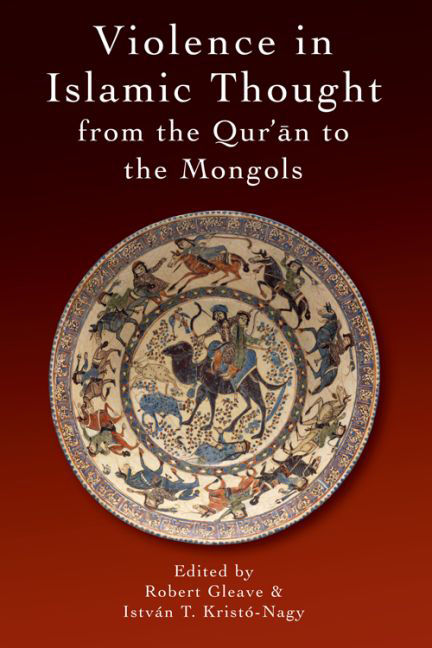Book contents
- Frontmatter
- Contents
- Dates and Abbreviations
- List of Figures and Tables
- 1 INTRODUCTION
- PART I JIHĀD AND CONQUEST: ATTITUDES TO VIOLENCE AGAINST THE EXTERNAL ENEMIES OF THE MUSLIM COMMUNITY
- PART II THE CHALLENGED ESTABLISHMENT: ATTITUDES TO VIOLENCE AGAINST THE STATE AND IN ITS DEFENCE WITHIN THE MUSLIM COMMUNITY
- PART III LUST AND FLESH: ATTITUDES TO VIOLENCE AGAINST THE DEFENCELESS, INTRA-COMMUNITARIAN VIOLENCE BY NON-STATE ACTORS
- 10 VIOLENCE AGAINST WOMEN IN ANDALUSI HISTORICAL SOURCES (THIRD/NINTH–SEVENTH/THIRTEENTH CENTURIES)
- 11 SEXUAL VIOLENCE IN VERSE: THE CASE OF JITHIN, AL-FARAZDAQ'S SISTER
- 12 BANDITS
- 13 EATING PEOPLE IS WRONG: SOME EYEWITNESS ACCOUNTS OF CANNIBALISM IN ARABIC SOURCES
- 14 ANIMALS WOULD FOLLOW SHĀFIISM: LEGITIMATE AND ILLEGITIMATE VIOLENCE TO ANIMALS IN MEDIEVAL ISLAMIC THOUGHT
- Bibliography
- Index of Qurānic Citations
- General Index
12 - BANDITS
from PART III - LUST AND FLESH: ATTITUDES TO VIOLENCE AGAINST THE DEFENCELESS, INTRA-COMMUNITARIAN VIOLENCE BY NON-STATE ACTORS
Published online by Cambridge University Press: 15 September 2017
- Frontmatter
- Contents
- Dates and Abbreviations
- List of Figures and Tables
- 1 INTRODUCTION
- PART I JIHĀD AND CONQUEST: ATTITUDES TO VIOLENCE AGAINST THE EXTERNAL ENEMIES OF THE MUSLIM COMMUNITY
- PART II THE CHALLENGED ESTABLISHMENT: ATTITUDES TO VIOLENCE AGAINST THE STATE AND IN ITS DEFENCE WITHIN THE MUSLIM COMMUNITY
- PART III LUST AND FLESH: ATTITUDES TO VIOLENCE AGAINST THE DEFENCELESS, INTRA-COMMUNITARIAN VIOLENCE BY NON-STATE ACTORS
- 10 VIOLENCE AGAINST WOMEN IN ANDALUSI HISTORICAL SOURCES (THIRD/NINTH–SEVENTH/THIRTEENTH CENTURIES)
- 11 SEXUAL VIOLENCE IN VERSE: THE CASE OF JITHIN, AL-FARAZDAQ'S SISTER
- 12 BANDITS
- 13 EATING PEOPLE IS WRONG: SOME EYEWITNESS ACCOUNTS OF CANNIBALISM IN ARABIC SOURCES
- 14 ANIMALS WOULD FOLLOW SHĀFIISM: LEGITIMATE AND ILLEGITIMATE VIOLENCE TO ANIMALS IN MEDIEVAL ISLAMIC THOUGHT
- Bibliography
- Index of Qurānic Citations
- General Index
Summary
This chapter deals primarily with two kinds of stories about bandits (in Arabic, anyone of whom it is said kāna yaqṭa'u al-ṭarīq). In stories of the first kind, bandits explain why they rob travellers. In stories of the second kind, biographers claim that various Abbāsid figures spent some of their lives as highwaymen. I will argue that the two kinds of reports may productively be read together. Admittedly, this material is too limited in quantity and too self-consciously literary to permit a reliable characterisation of rural unrest during the early Abbāsid period. Even so, a close reading of these reports will allow us to offer some tentative proposals about how banditry was imagined and, more generally, how the various genres of Classical Arabic narrative responded to the legal, ethical and moral questions raised by highway robbery.
As my title acknowledges, it is impossible to consider this subject without relying on the work of Eric Hobsbawm and his critics. In his foundational study (first published in 1969 and revised in 2000) of the phenomenon, Hobsbawm argues – to do him the disservice of a brutally truncated summary – that banditry is a form of protest against the exploitation of the peḤtry. It is, moreover, remarkably similar in its manifestations all over the world: imagined as the avenger of wrongs, the bandit becomes a hero of popular memory.In response, critics such as Anton Blok and Kim A. Wagner have pointed out that legend is not a reliable guide to the activities of real bandits. There are different kinds of bandits, including some who, far from stealing from merchants and landlords, act in collusion with them. Bandits must therefore be studied on a case-by-case basis, with due attention given to local circumstances.
With these points in mind, let us turn to our first report (I; T 4:259–63), one of several collected by al-Qāḍī al-Tanūkhī (d. 384/994) in his book about divine providence and narrow escapes. This report is unusual, in that it features a narrator who is, or claims to be, a peḤt. While camping near a mill, he shares his provisions with a very large man named Shaddād, who asks him what he is doing there.
- Type
- Chapter
- Information
- Violence in Islamic Thought from the Qur'an to the Mongols , pp. 191 - 199Publisher: Edinburgh University PressPrint publication year: 2015



